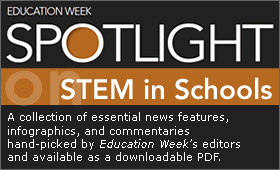figuring out how to make a device or establish a process specific to a task. But core engineering ideas and concepts are often neglected, the report says.
That’s the conclusion, outlined in a study released last week, of an expert committee charged with evaluating the status of engineering lessons in K-12 schools and judging their effectiveness.
The report was completed by the National Academy of Engineering and the National Research Council, independent, nonprofit entities that are chartered by Congress to provide advice to federal lawmakers on science and technology issues.
Engineering lessons can “act as a catalyst for a more interconnected and effective K-12 STEM education system in the United States,” say the authors, referring to science, technology, engineering, and math education. “Achieving [that] outcome will require significant rethinking of what STEM education can and should be.”
Yet currently, engineering study is a “work in progress” in U.S. schools, the report acknowledges. Unlike mathematics and science, no formal learning standards or assessments on par with those in other subjects have been crafted for engineering, they say, and relatively little is known about how most schools attempt to approach the topic in the curriculum.
In addition, the research on the potential benefits of K-12 engineering studies is mixed, partly because few meticulous studies on the topic have been conducted, the authors say. They nonetheless point to some research suggesting that K-12 engineering study can lead to stronger math and science achievement. In particular, they cite math and science gains made by students who have taken part in engineering-focused programs like Project Lead the Way, as well as among those who had participated in specially designed K-12 engineering classes with curricula created by schools and science centers. (“Engineering a Blueprint for Success,” Sept. 26, 2007.)
A Blended Approach
The record is also uneven on whether engineering studies boost achievement among students underrepresented in certain STEM fields, particularly females and minorities, though some approaches have shown success in that area, the report says.
“There is so much about engineering, as part of the design process and the need to use math in a specific way, that is helpful to students,” said Robin Willner, the vice president of global-community initiatives for the IBM Corp., in Armonk, N.Y., who served on the committee that produced the report.
Students live in “a world that’s shaped by engineering,” Ms. Willner added, and they “need to understand what that’s about.”While almost no engineering curricula or programs existed 15 years ago, several dozen are being used across the country now, the authors estimate. Only about 6 million K-12 students have had some kind of formal engineering education since the early 1990s, in a country that has a total enrollment of about 56 million per year.
The committee found that to the extent that the topic is covered in schools, “engineering design” tends to receive the most focus. That work, which the committee describes as the central activity in the field, is defined as the steps engineers use to solve problems, such as figuring out how to make a device or establish a process specific to a task. But core engineering ideas and concepts are often neglected, the report says.

Engineering lessons should ask students to make use of math, science, and technology knowledge and skills, the authors say, and emphasize problem-solving, the ability to use equipment and technology, communication, and collaboration with others.
The committee is not arguing that schools need to create new, stand-alone engineering classes, Ms. Willner said. A more realistic approach is to blend engineering conceptsand exercises into math, science, and other classes in elementary, middle, and high schools.
“In order to reach all students,” she said, “it has to be integrated.”
Engineering topics allow students to solve problems across a variety of fields, and as a result, they appeal to teenagers with a range of abilities and interests, said Steve Meyer, a teacher from the 900-student Brillion district, in Wisconsin.
Mr. Meyer, who teaches engineering topics in his district, located south of Green Bay, spoke at a Washington forum hosted by the National Academy of Engineering on the day of the report’srelease. In his classes, the teacher explained, students often find themselves tackling math and science concepts through a range of problem-solving exercises drawn from aviation, manufacturing, and other areas.
“We teach breadth, not depth,” Mr. Meyer told the audience, in describing the range of topics covered. “You find that if these students are able to find something they’re interested in, ... the educational process no longer becomes a chore.”








